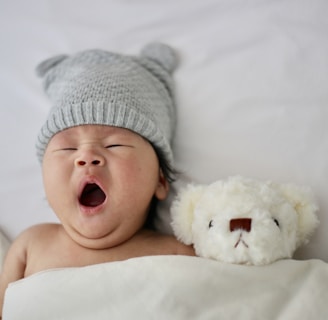The Healing Power of Sleep: Nature’s Remedy for Pain and Stress
Sleep is more than rest — it’s the body’s natural medicine. This article explores how sleep aids recovery from physical pain, reduces stress, and supports emotional healing, offering powerful insights into why good sleep is essential for overall well-being.
6/19/20253 min read


💤 Why Sleep Is Every Child’s Superpower — And Parents’ Secret Weapon, Too
If there were a pill that could boost your child’s memory, improve their mood, strengthen their immune system, support growth, and sharpen focus — with zero side effects — would you give it to them?
Good news: that miracle already exists.
It’s called sleep.
In today’s busy world, sleep often gets pushed aside. But science is clear: sleep isn’t optional — it’s essential, especially for growing kids.
Prioritizing sleep might be the most powerful health choice you make for your child — and for yourself.
🧠 Mental Healing: Emotional and Cognitive Recovery
Sleep isn’t just rest — it’s recovery, especially for a child’s developing brain.
During REM (Rapid Eye Movement) sleep, the brain processes emotional experiences and integrates memories. This stage is essential for helping children recover from daily stress, anxiety, and sensory overload.
Here’s what REM sleep does for kids:
Consolidates learning by organizing and storing new memories
Regulates emotions and strengthens impulse control
Boosts attention span and overall cognitive function
note: Children who don’t get enough sleep often show symptoms that resemble ADHD — including irritability, difficulty concentrating, and behavioral issues. So before assuming a behavioral disorder, it’s worth examining their sleep habits.
💪 Physical Recovery and Growth: Where Healing Happens
You’ve probably heard the phrase “kids grow in their sleep” — and it’s absolutely true.
During deep non-REM sleep, the body releases growth hormone (GH), a key player in physical development. This is also when tissue repair, cell regeneration, and immune system strengthening happen at full speed.
What sleep supports physically:
Bone and muscle growth through GH release
Faster recovery from illness or injury
A stronger immune system and better resilience
Without quality sleep, your child’s body can’t repair itself efficiently — making them more vulnerable to illness and developmental delays.
📏 Sleep and Height: Yes, It Really Matters
It may sound dramatic, but chronic sleep deprivation can literally stunt a child’s growth. Research shows that inadequate sleep during key developmental windows can:
Reduce height and weight gain
Disrupt metabolic regulation, increasing the risk of obesity
Affect long-term physical and hormonal development
In short: kids don’t just feel tired when they miss sleep — their growth potential can be compromised.
🦠 Immunity and Long-Term Health
Sleep isn’t just important for avoiding crankiness — it’s central to disease prevention.
During sleep, the body releases cytokines, proteins that fight off infections and regulate inflammation. Well-rested children are better protected from both short-term bugs and long-term health issues.
When children sleep well:
They get sick less often
Recover more quickly from colds and infections
Respond better to vaccines
Kids who chronically lack sleep may find themselves more susceptible to illnesses, from seasonal colds to more serious conditions later in life.
👨👩👧👦 Don’t Forget the Parents: Why Your Sleep Matters, Too
Sleep isn’t just essential for children — it’s critical for parents as well. When adults are sleep-deprived, it impacts everything from mood to metabolism, relationships to resilience.
Why parents need good sleep:
Improved patience and emotional regulation — key for parenting calmly and effectively
Better immune function, reducing burnout and chronic fatigue
Sharper decision-making, memory, and productivity
Lower risk of anxiety, depression, and long-term health issues (like heart disease or diabetes)
Sleep-deprived parenting isn’t just harder — it can become a cycle. When kids don’t sleep, parents don’t sleep. And when parents are running on empty, stress and tension increase across the whole household.
Modeling healthy sleep habits also teaches children that rest is valuable — not something to sacrifice, but something to protect.
🕒 How Much Sleep Do Children Need?
Wondering what “enough” sleep really means? Here are the recommended sleep guidelines from health authorities like the CDC and AAP:
Age Group Recommended Sleep (per 24 hours)Newborns (0–3 months)14–17 hours Infants (4–12 months)12–16 hours (including naps)Toddlers (1–2 years)11–14 hours (including naps)Preschoolers (3–5 years)10–13 hours (including naps)School-aged (6–12 years)9–12 hoursTeenagers (13–18 years)8–10 hours Adults 7–9 hours
Yes — even you need your 7–9 hours, consistently.
⚕️ Final Word: Sleep Deserves the Same Respect as Food and Medicine
We spend a lot of time worrying about our children’s diet, screen time, and education — and rightly so. But sleep is just as vital, if not more so.
As a medical professional, I urge caregivers, educators, and health providers to treat sleep as a cornerstone of family health. It’s as essential as nutrition, vaccinations, and emotional connection.
If we want our children to thrive — physically, emotionally, and mentally — then sleep is the superpower we cannot afford to ignore.
✅ Action Steps for the Whole Family:
Set a consistent bedtime routine for children and adults
Turn off screens at least 1 hour before sleep
Create a calm, dark, cool sleeping environment
Model healthy sleep — kids learn from watching you
Prioritize rest as a form of self-care, not a reward
Sleep isn’t a luxury. It’s medicine — for growing minds and for the parents who guide them.


